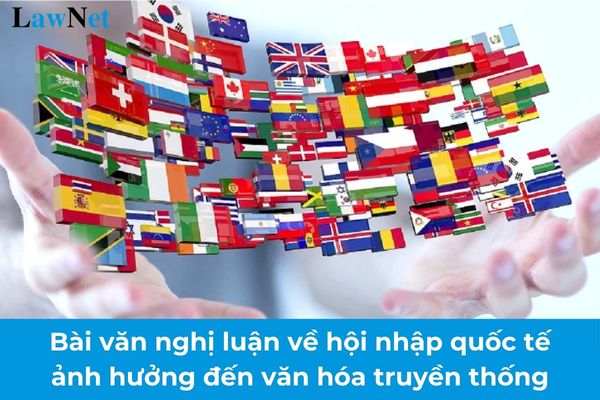What is the sample argumentative essay on the topic "International integration gives not only many opportunities but also significant challenges for the preservation and development of the traditional culture of Vietnam"?
What is the sample argumentative essay on the topic "International integration gives not only many opportunities but also significant challenges for the preservation and development of the traditional culture of Vietnam"?
In the era of international integration, finding ways to preserve national identity while integrating with the world is an important issue that requires careful attention and skillful solutions.
To address this matter, below is a sample argumentative essay on the topic "International integration gives not only many opportunities but also significant challenges for the preservation and development of the traditional culture of Vietnam":
|
International integration gives not only many opportunities but also significant challenges for the preservation and development of the traditional culture of Vietnam International integration is an inevitable trend in the context of globalization, as nations and peoples enhance connections and cooperation across various fields, from economics, and politics, to culture. This process opens up numerous valuable opportunities for cultural exchange, promotion, and enrichment of traditional cultural values, but at the same time, it presents considerable challenges in preserving national cultural identity. From the perspective of the younger generation, this is a complex issue that demands careful consideration, responsibility, and creativity to balance between developing and preserving culture. |
Note: The above content is for reference only.

What is the sample argumentative essay on the topic "International integration gives not only many opportunities but also significant challenges for the preservation and development of the traditional culture of Vietnam"? (Image from the Internet)
In Vietnam, what are the international integration tasks in education during the industrialization and modernization of the country?
Under Subsection 5 Section 3 Resolution 29-NQ/TW in 2022, the international integration tasks in education during the industrialization and modernization of the country are:
- Review and complete strategies on education, training, and national human resource development in line with the requirements of industrialization and modernization.
- Reorganize vocational training and higher education institutions in the fields of engineering and technology.
- Implement training activities on science-technology knowledge and innovation in schools.
- Develop national and local, sectoral, and field-level programs on training, attracting, and utilizing talent, and skilled workers with specialized expertise.
- Build and implement training programs for experts, high-quality human resources, and technical workers in foundational industries, prioritized industries, and leading industries.
- Pay attention to training and improving the education level of the rural workforce; increase the number of skilled technical workers; develop research personnel and experts in agriculture.
- Encourage the development of open online teaching and learning platforms, and new university models adapted to the digital transformation process.
What are the duties of students in Vietnam?
Under Article 82 of the Education Law 2019 which stipulates the duties of students in Vietnam:
- Perform learning and training tasks according to educational programmes and plans, code of conduct of educational institutions.
- Respect teachers, staff and workers of educational institutions; maintain solidarity and mutual support in learning and training; adhere to rules, charters and regulations of educational institutions; and comply with the law.
- Participate in labour and social activities, environmental protection activities appropriate to their age group, health and ability.
- Preserve and protect properties of educational institutions.
- Contribute to the building, protection and development of the traditions of educational institutions.

